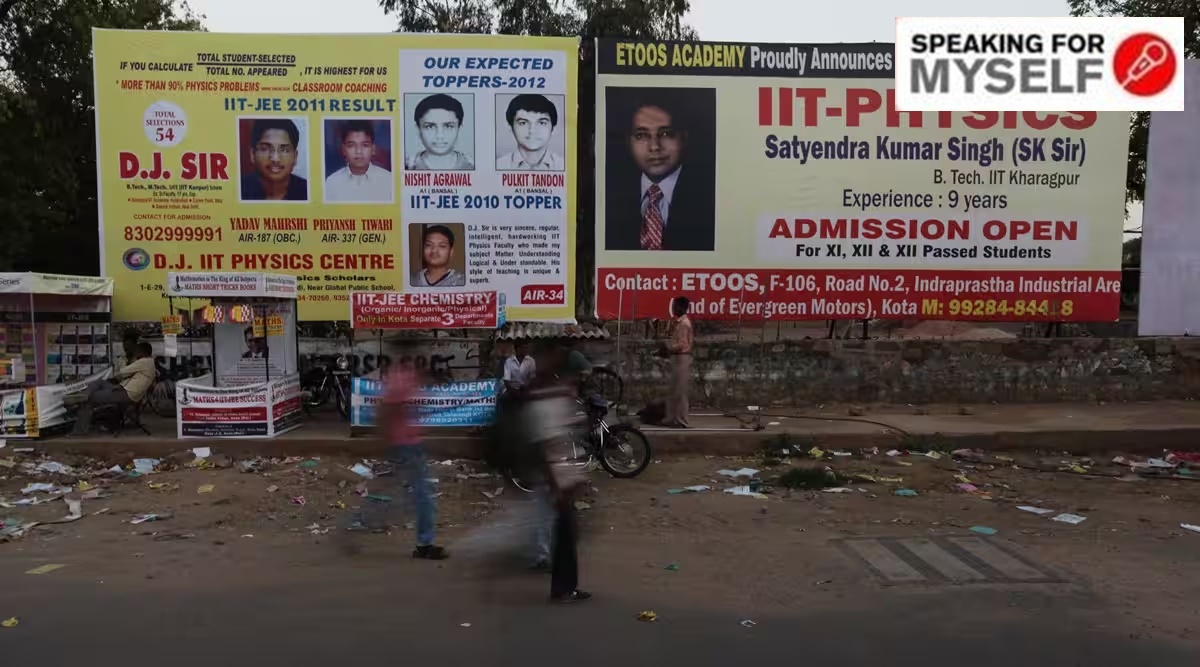
Written by Akash Kumar
The recent wave of suicides in Kota unveils a profoundly distressing tale that goes beyond the surface. I am reminded of Tulsidas’s verse, ‘Bhade Bhava Manush Tan Pava’ (After many virtuous deeds, you get a human body).
What’s particularly striking is that these heartbreaking incidents are unfolding before the exams, not after. Several years ago, I too embarked on the journey of preparing for the IIT-JEE entrance exam in Ranchi. Unlike many, I chose to forego the conventional coaching classes. My decision was rooted in my desire to avoid the additional strain that often accompanies juggling both regular schooling and rigorous coaching. The experience I underwent closely mirrored what one might encounter in Kota — a constant barrage of JEE advertisements gracing the morning newspapers, coaching pamphlets finding their way to us outside the school gates, persistent coaching calls urging enrolment, and imposing coaching hoardings lining the roadside. Every sensory cue seemed designed to serve as a reminder, a persistent nudge to ensure success in the impending examination. This exists in every major city.
I navigated this tumultuous journey and also witnessed my peers’ struggles. There are systemic factors that drive such outcomes. Yet, within the depths of this crisis also lies the potential for remedy.
In a world where aspirations for upward mobility are fervent, the opportunities for achieving such dreams remain limited. When one generation falls short, the mantle of ambition passes to the next, embedding within it a heavy burden of responsibility. Failing to meet these expectations can lead to profound sorrow, and in the direst cases, even to suicide. It’s in this landscape that coaching institutes assume a significant role, cultivating an atmosphere of uncertainty among students and parents. This deliberate cultivation of insecurity fosters a cycle of dependence, wherein students come to rely on these institutions for guidance. A stark discrepancy emerges between preparation for board examinations and competitive tests, amplifying the inequalities that plague the education system. The coaching industry’s massive marketing campaigns further exacerbate the situation, with some strategies veering into ethical grey areas.
Works like Kota Factory and Crash Course reveal the inner workings of this marketing machinery, offering a glimpse into a world where the name of the game is attraction. Reports of toppers auctioning their ranks to multiple coaching institutes reveal a darker side of this competitive frenzy. The tests themselves, designed to be more challenging than standardised exams, set the stage for feelings of inadequacy and self-doubt when not conquered.
Our educational system is tailored to gauge an individual’s merit through examinations. While this meritocratic approach holds promise in sieving out talent, its shortcomings loom large. Eminent thinker Michael J Sandel dubs this system the “tyranny of merit”, a sentiment echoed by the Supreme Court of India. Upholding the OBC reservation judgment, the Court called for a deeper evaluation of the “idea of merit”, highlighting its nuanced nature. Merit as a concept remains shrouded in misunderstanding and often goes unexamined within school curricula.
Advertisement
Chief Justice of India D Y Chandrachud noted that true merit is multifaceted and extends beyond performance in a single competitive examination, urging a broader context that champions social equality. This is especially pertinent in a country like India, where pervasive inequalities shape an individual’s circumstances but often go unnoticed in the pursuit of exam-based success.
The sprawling coaching industry’s concentration in prominent cities compels students from smaller towns and villages to migrate for their studies, a transition fraught with challenges. Adapting to new living arrangements, sourcing nourishing meals, battling isolation, and grappling with commutes form the backdrop against which education unfolds. For marginalised communities and gender minorities, these hurdles are often amplified. Furthermore, the adolescent phase — a time of rapid growth and identity formation — coincides with this shift, making it a pivotal yet precarious juncture. Social media algorithms exacerbate mental health concerns, sowing loneliness and impeding attention spans and creativity. This, coupled with subpar nutrition from profit-driven meal services, leaves students physically and mentally vulnerable.
The genesis of this issue lies in the mindset of both students and parents—a mindset perpetuated, albeit unintentionally, by the coaching industry. In an environment where educators vie for the highest paychecks, students naturally emulate this pursuit of external success. The transition from being mere job-seekers to becoming job creators necessitates a paradigm shift. Programmes like the televised Shark Tank have encouraged entrepreneurship on a smaller scale, but greater efforts, including those like our Prime Minister’s Pariksha Pe Charcha, are imperative to drive this transformation.
Most Read
Advertisement
Technology emerges as a potential equaliser in this landscape. Online platforms now offer preparation opportunities from the comfort of one’s home. Government-curated or market-driven content could usher in a new era of accessibility. Providing subsidised internet access to aspiring students could further bridge this gap. Moreover, awareness of diverse job prospects is burgeoning, reflecting the evolving job market. With India poised to become a $26 trillion economy by 2047, embracing this potential will undoubtedly be pivotal. The path forward requires a collective “yes” to life, to learning, and to the myriad opportunities that await.
In confronting the Kota conundrum, we are not just addressing the challenges of education and mental health; we are sculpting a future of promise and possibility. Through compassionate reforms, innovative approaches, and a reimagined understanding of merit, we can rewrite this narrative, empowering the next generation to thrive in a world rich with opportunities.
The writer is the former convenor of Ashoka Distinguished Policy Speaker Series, Ashoka University
Bagikan Berita Ini















0 Response to "Kota suicides: Coaching institutes manufacture insecurity — moving beyond the tyranny of merit might help - The Indian Express"
Post a Comment